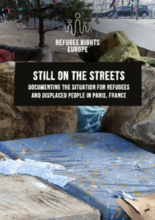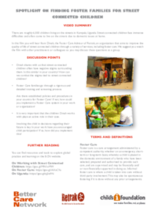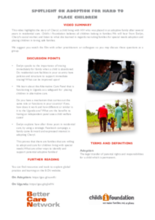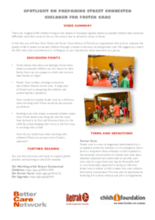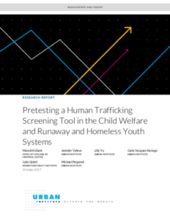Displaying 51 - 60 of 228
For this study, forty men and women from five semi-rural villages in Meru County, Kenya participated in a Rapid Rural Appraisal to explore main and underlying reasons why children may be, or may feel, unwelcome in the home and thus migrate to the street.
This study asked three primary questions: 1) What is the nature of crisis children encounter on the street? 2) What are the ranges of informal caregiving practices? 3) What social network characteristics facilitate or complicate caregiving?
This article aimed to investigate traumas experienced by street children and their coping and resilience strategies used to deal with adversities in a logic of survival, relying on a mixed method approach.
This paper adopts a qualitative case study on the generalist service delivery model of I‐Care, a Durban‐based non‐governmental organization that works with male street children.
In this video, Dinah Mwesigye, a social worker at Retrak in Kampala, Uganda, describes the process of finding foster families for street-connected children who are not able to be reunified with their biological families.
In this video, social worker Evelyn Nateza describes the process used by Child's i Foundation to find Ugandan adoptive families for hard-to-place children.
In this video, Dinah Mwesigye, a social worker at Retrak in Kampala, Uganda, describes Retrak’s work with street-connected children to prepare them for foster care.
This video series from Better Care Network, in partnership with Child's i Foundation, highlights promising practices in children's care in Uganda.
Aiming to assist providers to identify and better serve the needs of youth victims of human trafficking, this study developed and pretested a Human Trafficking Screening Tool used to identify youth in the child welfare system and runaway and homeless youth who have experiences of trafficking,

